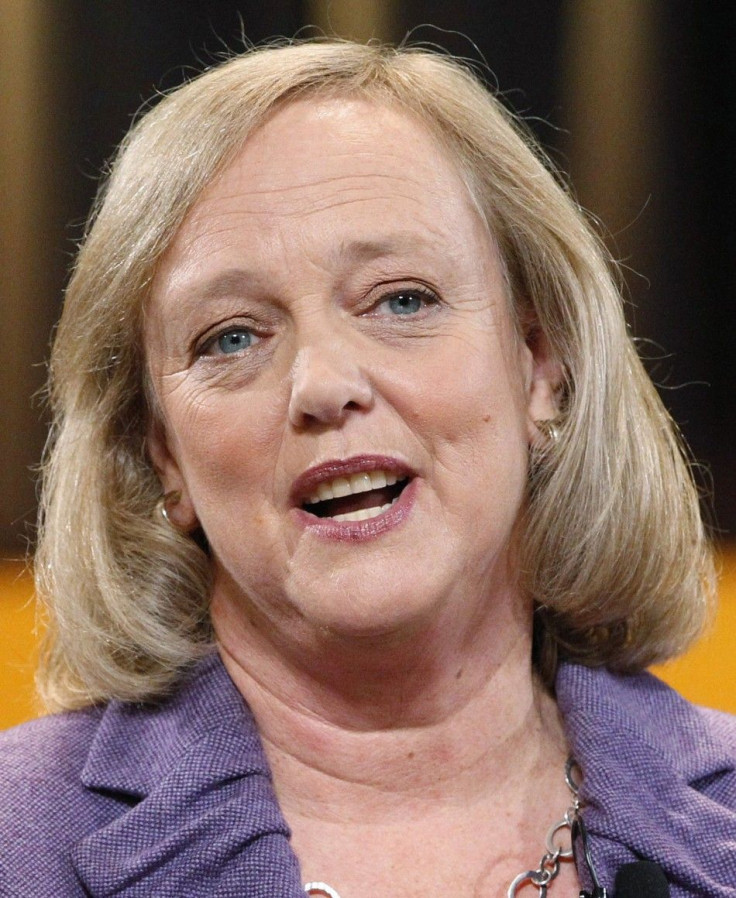Does Hewlett-Packard Fear the Wrath of Shareholders?

Hewlett-Packard (NYSE: HPQ) recently took the rather unusual step of hiring investment bank Goldman Sachs Group Inc. (NYSE: GS) allegedly to protect the company from the actions of angry HP shareholders who may seek to remove the board.
HP recently named ex-eBay (Nasdaq: EBAY) boss Meg Whitman as its chief executive -- a move that was widely assailed by analysts and others -- to replace Leo Apotheker, who was blamed for failing to establish a solid strategy for the firm (and, of course, for the tumbling stock price).
HP and Apotheker were also attacked for such strategic blunders as buying U.K. software firm Autonomy for an absurdly high price and for making premature plans to spin-off its PC business, among other things,
The Wall Street Journal reported that HP feels it is “vulnerable” to potential “pressure” from “activist investors.”
Indeed, by accumulating enough shares, stockholders would have the ammunition to force changes.
But why hire Goldman Sachs?
WSJ explained that Goldman is well known on Wall Street for its ability to thwart hostile takeovers or aggressive actions by irate stockholders, citing its assistance with NYSE Euronext (NYSE: NYX) in fending off bids by Nasdaq OMX Group (Nasdaq: NDAQ) and Intercontinental Exchange ( NYSE: ICE) earlier this year.
Goldman has also reportedly helped Yahoo (Nasdaq: YHOO), Airgas (NYSE: ARG) and Potash Corp. of Saskatchewan (NYSE: POT) fight off similar threats, according to the New York Times,
An HP spokesman, asked about the WSJ report, responded that the company "has long-term relationships with a large number of investment banks."
HP stock has lost almost half its value year-to-date; and also shed $60-billion in market cap since former chief executive Mark Hurd was forced out in August 2010.
Shareholders are rightfully aching for some drastic changes, including possibly the break-up of the company or the emplacement of new management. Of course, HP can prevent any such moves by inserting a "poison pill" – that is, a shareholder rights' plans that would make it very difficult for activist investors to mount a takeover of the company.
Anna N. Danielova, assistant professor of finance at the DeGroote School of Business in Hamilton, Ont., told International Business Times that hiring an investment bank (in this case, Goldman Sachs) for the sole purpose of blocking shareholder activism is indeed somewhat unusual.
“Such a reaction could be only rationally explained by HP’s fear of a takeover threat,” she said.
“The board could have hired an investment banker to evaluate the merits of being a takeover target and to coordinate a professional response in case of takeover interest.”
Danielova speculated that Goldman Sachs has expertise in managing these types of situations.
“Having said all that, HP should concentrate on addressing the bigger issues that brought the increased scrutiny of investors to begin with, i.e., their lackluster stock performance and their strategy or lack thereof,” she said
“They need to once again find themselves among the top technology firms. Until they do that, they would have to keep Goldman on their pay roster for a long time.”
She cites a recent survey on shareholder activism by Schulte, Roth & Zabel, which indicated that the most likely reasons behind such agitation are stock performance and strategic/operational changes,
Danielova concluded: “The principal question HP should be addressing if they need to defend themselves from a healthy dose of shareholder activism. After all, the activism focuses on the long-term and helps management improve its long-term performance.”
Meanwhile, the New York Times reported that neither Whitman nor HP’s executive chairman Ray Lane, have any interest in seeking to break-up or sell off the company – measures that dissatisfied shareholders are likely to demand.
© Copyright IBTimes 2025. All rights reserved.





















